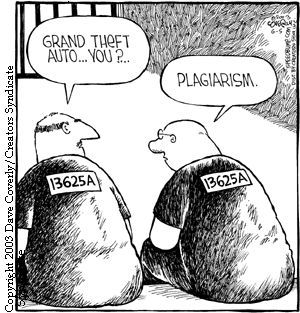|
We as writers have probably all been stuck at some point: What do we say, and how do we say it? We do our best to form the thought or idea into words, but it seems like someone else can simply write it better.
The temptation then starts to surface. No one will know if we borrow another person's words to make our way through a sentence or a paragraph, right? Maybe we can just change a few things or dress the text so nobody notices.
The dictionary.com definition of plagiarism is "an act or instance of using or closely imitating the language and thoughts of another author without authorization and the representation of that author's work as one's own, as by not crediting the original author." Harbrace College Handbook further explains that if we do not cite borrowed material, we are plagiarizing—i.e., stealing from a writer.
Whether words or music or inventions, another person's ideas are considered intellectual property and, as such, are protected by copyright laws as long as they are properly marked and recorded. (For more information about trademarks and copyrights, visit the U.S. Patent and Trademark Office website.)
Plagiarism can be either intentional or accidental; in either case, the results can be equally grave. For students, plagiarism might lead to failing a course or receiving academic probation or expulsion. For teachers and professors, as well as for those in the professional world, it can lead to costly lawsuits and losing a job.
While plagiarism has always been a concern within writing, it has become a much bigger matter in the age of the Internet. We now have greater, faster, and easier access to other people's words than ever before. To express something, we need only search, copy, and paste.
At the same time, whether they are software programs or online resources such as quetext, Plagium, or a basic Google search, digital checkers make spotting plagiarism equally effortless. The good news is that we can avoid plagiarism's disrepute and consequences by knowing and applying the ways to protect original writing.
When and How to Cite Sources
Writers are responsible for knowing what plagiarism is and how to avoid it in their work. The following guidelines provide a starting point for honest and responsible composition.
We need to cite a source when we are directly quoting, paraphrasing, or summarizing material from it. This applies to all content, including that which is found on the Internet.
Direct quote. When we copy another writer's words verbatim, depending on the length, we either enclose all of the text in quotation marks or otherwise set the text apart, such as in an indented paragraph. We then follow with citation of where the quoted matter came from. Some common citation formats are Modern Language Association, American Psychological Association, and Chicago Manual of Style. Whichever we choose for a piece of writing, we should remain consistent with it.
Paraphrase. When we paraphrase other writers, we state mainly in our words what they are expressing in specific text—i.e., we are interpreting a passage, particularly if it is complex. Although chiefly our writing, a paraphrase can include some direct expressions. We are not copying other writers word for word, but we must still cite the thoughts or ideas as theirs. A paraphrase can often be the same or greater in length as the cited content.
Summary. When we summarize other writers, we state in our words what they are expressing in selective text—e.g., we use brief language to explain the central idea of a section or a chapter in a book. Here too, although we are not directly copying other writers, we must still cite their thoughts or ideas as belonging to them. A summary is typically shorter than a paraphrase.
In certain instances, such as when publishing a book or an extensive magazine article, we might also need to acquire expressed permission to reprint cited content. To be thorough, we should verify with the other writers' publishers if such consent is required.
We do not need to cite sources when we write our own thoughts and ideas (i.e., those not borrowed from or influenced by other writers) or when we refer to common knowledge (e.g., Many Latin Americans speak Spanish).
As a guiding principle, whenever in doubt about whether we are copying another writer, we should cite the reference. Giving credit to the source is conscientious composition, and it allows our audience to either verify the source or learn more about a subject.
And that, in the end, builds a truthful, ethical bridge between us and our readers.
|





